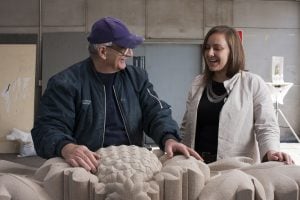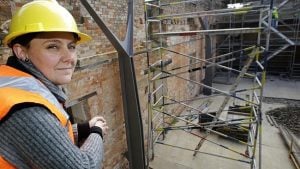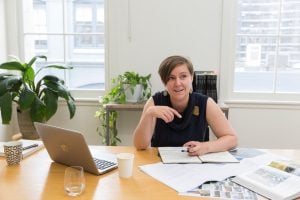Her journey from gleaming white boxes to the bricks and mortar of heritage conservation was unexpected, but gave Lucy Burke-Smith the freedom to combine fulfilling work with a quieter life in Tasmania.

On education and your career
Thank god for HECS. Without it, and in the face of your father’s very unhelpful position that ‘I hope you don’t think you’re going to university, because I’m not paying for it’, you may never have realised your childhood dream of becoming an architect. You show up to university as a naive seventeen-year-old, emboldened by the self-belief that your mother instilled in you and a real sense that you have something to prove. Try and remember that you don’t need to prove anything to anyone other than yourself.
Contrary to the misplaced perception that your best work is done in a sleep-deprived state you get through university without doing a single all-nighter, preferring your own bed to the floor of the design studio. You develop this approach into a reasonably sound work/life balance, supported in your initial career through roles in the public service. These opportunities afforded you equal pay and good conditions, things which continue to elude some corners of your profession even eighteen years later. Just promise me you’ll consider cutting the public-service umbilical cord a little sooner; you can find balance elsewhere if you believe in what you have to offer and understand a little more about what balance means to you.
While you may find this hard to believe, being an architect doesn’t define you, contrary to the projected vision you currently have. It becomes a part of you, which is no more important than your role as a mother, partner, sister, daughter or friend. The principal objective is to find a fulfilling career and real purpose, and you can give that a big tick.

On architecture and specialisation
Your thoughts on architecture are going to change – a lot. You’re probably spending your time developing design submissions that resemble gleaming white boxes. What you spend your career doing could not be further removed from this microcosm. Instead, you spend the first thirteen years of your career in roles that can most easily be described as ‘professional client’, and mostly in the field of heritage conservation. You write briefs, drive projects and set the parameters for the delivery of good design outcomes for government agencies. You specify and develop details for lead weathering, mortars and the conservation of sandstone. At one point someone will challenge if this constitutes architecture and you’ll have a period where you won’t even introduce yourself as one. Well, please, blow that off as soon as you can. Ours is a very diverse profession. You meet peers and mentors with such diversity in their ‘practice’ of architecture. Embrace the diversity and opportunities within the profession and recognise the huge breadth of transferable skills it brings.
By the time you pen this letter you you’ve been fortunate enough to gain a diversity of experience and skills in your specialist field. Opportunity presents in unexpected places and at opportune times. You would never have expected this path to see you moving away from a major capital and working remotely for an international practice. Maybe you should reflect on how valuable your skills are, and how capable you are in your work, such that you can find fulfilling work while hiding away in southern Tasmania.

On relationships and family
One of the most important and defining decisions of your life will be when you muster the courage to ask that guy you barely know out on a date. Don’t place importance on his age. You could prejudice a very beautiful partnership, one which influences and determines almost everything from this point. Nurture that relationship at every opportunity; it becomes so much more than simply love.
There will be a period in your early twenties when you envisage yourself as the mother of five sons. I’ve already pointed out your naivety! In some alternate universe, this image also sees you working as a successful sole practitioner. You see balance and harmony in this vision and you capably manage all of this while still aspiring to dress as elegantly and fabulously as Diane Jones, at all times, even with toddlers. You think you will be prepared for anything that comes your way, that you will be in control.
Well here, from some 18 years into your future, I can tell you that you can’t and won’t be prepared for everything. Nothing will prepare you for the pain of losing your first pregnancy, or the grief from losing your seventh and seeing the pain it brought your partner, one of society’s forgotten victims of miscarriage. Afterwards, nothing will prepare you for the anxiety of carrying your eighth pregnancy, even until the seconds immediately following the birth of your baby boy. It isn’t until his first cry and the pure joy on your partner’s face that you exhale with relief and gratitude. And then, nothing, absolutely nothing, will prepare either of you for the heartache that comes with the gut-wrenching news that this perfect little boy is to undergo intensive medical care and chemotherapy from just nine weeks of age.
For a while, from this point, everything seems out of your control. The care of your child, the structure of your days, weeks and months. As someone who needs order and purpose, you develop a dogged determination to express milk on a crazy self-imposed schedule when the intimacy of breastfeeding is taken from you. This seems all you can do to nurture your precious child other than to sit… and wait.
But be assured, as I write this letter to you, my younger self, your son is preparing to celebrate his fourth birthday. He is happy and healthy and completely disinterested in the paper mache piñata project that you’ve ambitiously embarked on in preparation for his birthday. The piñata might be the most creative thing you do all year.
On the importance of equality in co-dependence
At some point your mother instils in you the importance of maintaining the capacity to be financially independent. This is one of the best pieces of advice you think you will ever receive, as the emerging statistics in your late thirties indicate that single women of retiring age are some of the most financially marginalised of our society. This is, of course, no surprise. You will wonder why society and policy doesn’t better support women who become mothers. Why none of the policy writers are incentivising superannuation contributions by partners on behalf of primary caregivers when they take periods of parental leave, why employers don’t support and encourage flexible working practices for men to be active participants in domestic life and child raising.
Somehow you hit the jackpot. Your beautiful man is supportive of your career. He is an active and enthusiastic father. Together you decide that he will be the primary carer during your child’s infancy as you are the one with job security. Later you both work part time, having escaped your lives in the city and retreated to an environment of less financial, societal and work pressure.
On acceptance
As you approach forty, one of life’s biggest lessons has been one of acceptance. Releasing the frustration and resistance to those things that are out of your control and recognising that your emotional and mental energy should be invested in those things that you can positively and productively influence. Some things just can’t be explained and that is ok.

On opportunity
I could write about all the things you should have done, but instead I’m going to write of the things both you and I could do. They are mostly about seizing, or making, opportunities. Find time in the future for the ceramics course you’ve been seeking. Make the time to pull out the sewing machine for anything other than repairing garments. Enjoy the moments you steal for embroidery and don’t forget about your gran’s amazing encyclopaedia on stitch styles that you’re yet to master. Walk on the beach more often. Those other things can wait. Don’t pick up the phone, or check your emails outside work hours. And for God’s sake, stop worrying about your son colouring outside the lines.
Lucy Burke-Smith is a registered architect who works primarily in built heritage conservation. She spent her formative career in public services roles, including as custodian and manager of heritage-significant government property portfolios in Sydney and Tasmania. Now working in the private sector, she works to unlock opportunities for the ongoing use of heritage buildings and specifying traditional conservation methods to ensure their ongoing condition and integrity. When she isn’t working, you will find her wandering the beaches in southern Tasmania with her good man and their young son, and generally being a little less ambitious than she once was.




















